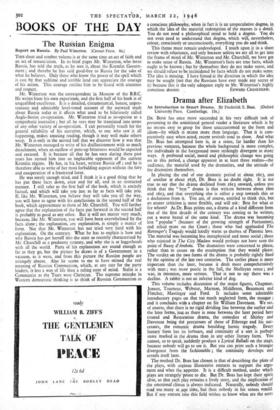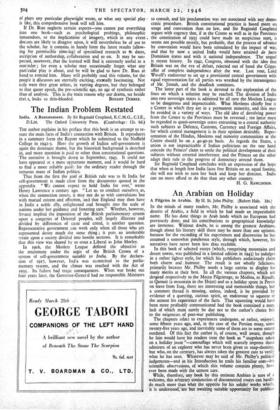Drama after Elizabeth
DR. BOAS has once more succeeded in his very difficult task of presenting to the uninitiated general reader a literature which is by no means easy to grasp for those unaccustomed to the form and idiom—by which is meant more than language. That it is com- paratively easy when acted, recent revivals tend to show. And what Dr. Boas has attempted here is, in a sense, far harder than his previous ventures, because the whole background is more complex, the individuals in the foreground more strikingly divergent in many ways. A profound social, moral and philosophic change was going on in this period, a change apparent in at least three realms—the audience, the material used by the dramatists, and the attitude of the dramatists themselves.
In placing the end of one dramatic period at about 1613, ana of another at about 1636, Dr. Boas is no doubt right. It is not true to say that the drama declined from 1613 onward, unless you think that the " best " drama is that written between about 1600 and 1613, and that everything else is either a step towards this or a declension from it. You are, of course, entitled to think this, but an acuter criticism is more flexible, and will ask : Best for what or for whom? As Dr. Boas points out, a drama of a kind different from that of the first decade of the century was coming to be written, not a worse brand of the same kind. The drama was becoming less " popular " (because of the growing strength of Puritanism), and relied more on the Court ; those who had applauded The Revenger's Tragedy would hardly warm to themes of Platonic love. The material was becoming less metaphysical and more social ; those who rejoiced in The City Madam would perhaps not have seen the point of Bussy d'Ambois. The dramatists were concerned to please, rather than to create on the assumption that they would please. The verdict on the two forms of the drama is probably rightly fixed by the opinion of the last two centuries. The earlier phase is more important than the later, because it dealt more comprehensively with man ; was more poetic in the full, the Shelleyan sense ; and was, in intention, more serious. That is not to say there was a decline. A rabbit is not an inferior kind of dog.
This volume includes discussion of the major figures, Chapman, Jonson, Tourneur, Webster, Marston, Middleton, Beaumont and Fletcher, Massinger and Ford. It includes some admirable introductory pages on that too much neglected form, the masque ; and it concludes with a chapter on Sir William Davenant. We see, of course, that there is no rigid dividing line between the earlier and the later forms, juwas there is none between the later period here treated and Restoration drama, the comedies of Shirley and Davenant being thd precursors of those of Etherege and his suc- cessors, the romantic drama heralding heroic tragedy. Every literary form has its forbears, and continuity of a sort is perhaps more marked in the drama than in any other literary form. You cannot, so to speak, suddenly produce a Lyrical Ballads on the stage, because nobody will go to see it. But you can print such a brusque divergence from the fashionable ; the continuity develops and reveals itself later.
The method Dr. Boas has chosen is that of describing the plots of the plays, with copious illustrative extracts to support the argu- ment and whet the appetite. It is a difficult method, under which plays are strangely prone to die. But Dr. Boas has kept their spirit alive, so that each play remains a lively story, and the implication of the emotional climax is always indicated. Naturally, nobody should read too, many at jaqe time, but then nobody in his senses would. But if any entrant into this field wishes to know what are the sorts of plays any particular playwright wrote, or what any special play is like, this comprehensive book will tell him. If 6r. Boas neglects certain aspects—you cannot put everything into one book—such as psychological probings, philosophic innuendoes, or the implications of imagery, which in any event doctors are likely to disagree upon, it will nevertheless be of use to the scholar, for it contains in handy form the latest results (allow- ing for permissible time-lag) of specialised research as tla dates, ascriptfon of authorship, collaboration and so on. It may be sus- pected, moreover, that the learned will find it extremely useful as a reminder ; for even a scholar may occasionally forget what any particular play is about, and he will be glad to have Dr. Boas at hand to remind him. Many will probably read this volume, for the people it discusses are eternally exciting, eternally fascinating. Not only were they great artists, in varying degrees, but they belonged to that queer epoch, the pre-scientific age, an age of synthesis rather than of analysis. This is the main reason why our drama, set beside































 Previous page
Previous page